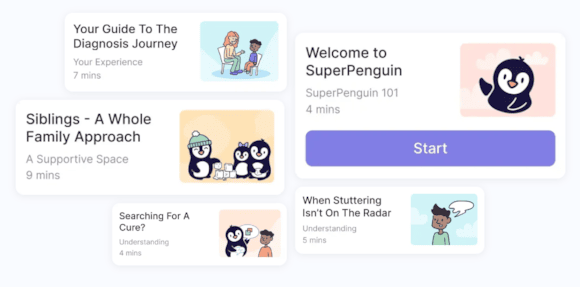Leeds Beckett University experts help to develop digital solution to support children who stammer
Speech and Language Therapy and Psychology researchers at Leeds Beckett University are joining forces with stammering experts, SuperPenguin, and three NHS organisations to develop an innovative app and web platform to support children who stammer.
The three-year project has received £1.5m funding from the National Institute for Health and Care Research (NIHR). The team will enhance and refine SuperPenguin – an innovative digital therapeutic solution, consisting of an app and web dashboard – to introduce new interactive tools for parents, carers and Speech and Language Therapists (SLTs). SuperPenguin aims to build confidence in children who stammer, lower anxiety and worry for children and parents, and reduce NHS waiting times for SLT services.

The project is co-led by Dr Trish Holch, Reader in Applied Health Psychology in the School of Humanities and Social Sciences at Leeds Beckett University, and Dr Ronan Miller, Director of Real World Evidence at SuperPenguin.
Dr Trish Holch said: “Working with the three NHS organisations – in South Yorkshire, Derbyshire and Berkshire – we will be trialling SuperPenguin with parents and SLT practitioners to find out how it is working for them, what needs to be refined, and what behaviour changes are needed to encourage widespread uptake across the NHS. The overall aim is to encourage children to feel that they don’t need to conform. I, myself, was a child with a stammer so I am really happy to be involved in this study.”
An earlier version of SuperPenguin – an app called Penguin: Stammering Support – was created by Dr Ronan Miller and Jordi Fernandez, who are both people who stammer. It was created to address the ‘postcode lottery’ that children who stammer face when waiting to access SLT services across the country. Developed with the support of specialist SLTs, Penguin contains a two-week course for parents and carers of children who stammer – each day provides bite-sized information about a practical way to support the child, and also the parent or carer themselves.
Dr Ronan Miller said: “Whilst waiting for access to SLT services, families can experience anxiety and stress. SuperPenguin is planned to be more interactive and personalised than Penguin, and really drive change within therapy pathways. We want to move away from a ‘fix it’ mindset to stammering and towards embracing children for who they are and understanding that they can still be a very confident and effective communicator even if they stammer.”
Around eight per cent of children have a stammer, with at least one per cent continuing to stammer as an adult. (source: STAMMA.org)
Ben Bolton-Grant is Course Director for MSc Speech and Language Therapy at Leeds Beckett University and a Speech and Language Therapist who specialises in working with people who stammer and children’s communication. He said: “There is some very useful support out there. However it can be difficult to access, particularly in some parts of the country. NHS waiting lists can be long – pre-Covid, in some areas, children were waiting two years, which is a long time when a child is only three. Resources are even more stretched following Covid.
“Penguin is currently recommended by the NHS as part of the advice and support therapists provide to families – it gives them something to be doing whilst waiting for further support and may mean that people don’t need to access that support at all – or that when therapy happens it is more successful.”
As well as working with SLTs at the three NHS organisations to create and develop SuperPenguin, the team will be testing it with families. They will gain their feedback through interviews and focus groups and include parents of children who stammer as part of the research team.
Heather Brigden-McLean’s youngest daughter, Jasmine, is now almost seven and started stammering at age three. Heather, who is from Crawley in West Sussex, said: “Jasmine’s stammer developed during Covid and there was very limited help available. Our only support were charities like Stamma and Action for Stammering Children. Later we also privately accessed the Michael Palin Centre for Stammering for therapy.
“Through contacts with the charities, I became involved with the initial testing of Penguin and found it great – it really focuses on you as a parent and is very empowering. I am now working with parents and other agencies to gather feedback which will shape the design of the SuperPenguin app and ensure it meets the real world needs of its users.
“I believe SuperPenguin is going to be a real game-changer – giving parents early access to information and real strategies they can employ whilst waiting for therapy. It will raise awareness and help to make stammering a normalised, everyday occurrence in society. As a parent of a stammering child, you can feel very alone and powerless – this solution will really help to end that and connect families much earlier to the help and support they need.”
Nicola Maddy, SLT at South West Yorkshire Partnership NHS Foundation Trust, said: “I’m excited and looking forward to using SuperPenguin with the families of children and young people who stammer and hope that the innovative approach will enhance the delivery of care within stammering therapy in South West Yorkshire NHS Trust. I hope it will align with the stammering affirming therapy we offer and sow important seeds that stammering is a beautiful and valuable way of speaking that doesn’t need to be fixed.”
Dr Miller added: “It means a lot to be developing SuperPenguin – as a child, I thought my opportunities would be very limited socially and professionally. To have the opportunity to directly affect the lives of other young people is a profound experience. There is a lot of misunderstanding around what stammering is and why it happens – so it is important that we have received such a large grant to raise the awareness and profile of stammering in the UK. Following the development and testing of SuperPenguin, we hope to apply for more funding to do a larger study to find out the impact of using SuperPenguin.”

